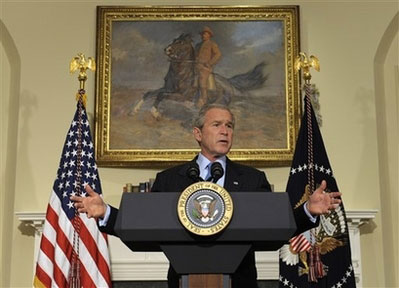The top political advisor in China called for more religious freedom and harmony this week as a senior U.S. diplomat visited the country and hailed improved ties between the two former foes under President George W. Bush.
Jia Qinglin, chairman of the National Committee of the Chinese People’s Political Consultative Conference (CPPCC), told religious workers to continue to protect citizens’ freedom of religious belief and to encourage people of faith to play an active role in the country’s social and economic development, according to China’s official press outlet Xinhua News Agency.
Religious believers should be part of the effort to transform China into a moderately well-off society, the influential Chinese official said at a national conference on religious work on Wednesday.
His comments came as the Bush administration sent its last scheduled representative to China before President-elect Barack Obama takes office on Jan. 20.
Deputy Secretary of State John Negroponte on Thursday, the second and final day of his visit, praised U.S.-China ties as being the warmest since the two superpowers formally established diplomatic ties in 1979.
“The United Sates-China relationship has never been better,” said Negoponte, according to Agence France-Presse.
China’s foreign ministry spokesman Qin Gang concurred, noting that someone reviewing the past 30 years “would naturally draw that conclusion.”
Negroponte, who went in place of Secretary of State Condoleezza Rice who is busy monitoring the Gaza-Israel conflict, also said that improved U.S.-China relations will be among President Bush’s greatest legacies.
“I would venture to predict that when historians look at the record of the Bush administration, surely one of the highlights will be the progress that has been achieved in the United States-China bilateral relationship," he said.
Bush has called China a “strategic competitor,” but has nonetheless worked closely with the growing superpower with the booming economy. Under the Bush administration, the two countries agreed to hold biannual high-level economic talks called the Strategic Economic Dialogue.
Yet despite warmer ties, the two global giants still bristle when it comes to issues of human rights and religious freedom.
President Bush has been an outspoken advocate of religious freedom and has many times confronted high-level Chinese officials on the country’s respect for freedom of worship, especially for unregistered house church Christians.
During the Beijing Olympics last summer, Bush made strong comments concerning the need for China to respect religious freedom after attending a government-sanctioned church.
He declared that “no state, man or woman should fear the influence of loving religion” while standing outside state-sanctioned Kuanjie Protestant church in Beijing.
In the past, Bush has invited Chinese house church leaders and activists to the White House and expressed strong support for their right to worship in unregistered churches, a move that angered Chinese officials.
Some estimates put house church Christians at 100 million, but the numbers fluctuate vastly below and above that figure.
U.S. diplomat Negroponte also noted that China has expressed eagerness to work with Obama and his administration.
“The government of the People’s Republic of China certainly looks forward to working with the next administration and it is eager to undertake dialogue with our new government as soon as possible,” he said.
















